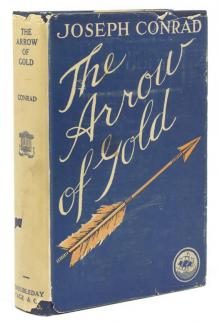- Home
- Joseph Conrad
Complete Works of Joseph Conrad (Illustrated) Page 6
Complete Works of Joseph Conrad (Illustrated) Read online
Page 6
Almayer had approached his daughter, and leaning with both arms over the rail, was looking moodily down on the heap of rubbish and broken bottles at the foot of the verandah.
“What was all that noise just now?” he growled peevishly, without looking up. “Confound you and your mother! What did she want? What did you come out for?”
“She did not want to let me come out,” said Nina. “She is angry. She says the man just gone is some Rajah. I think she is right now.”
“I believe all you women are crazy,” snarled Almayer. “What’s that to you, to her, to anybody? The man wants to collect trepang and birds’ nests on the islands. He told me so, that Rajah of yours. He will come to-morrow. I want you both to keep away from the house, and let me attend to my business in peace.”
Dain Maroola came the next day and had a long conversation with Almayer. This was the beginning of a close and friendly intercourse which, at first, was much remarked in Sambir, till the population got used to the frequent sight of many fires burning in Almayer’s campong, where Maroola’s men were warming themselves during the cold nights of the north-east monsoon, while their master had long conferences with the Tuan Putih — as they styled Almayer amongst themselves. Great was the curiosity in Sambir on the subject of the new trader. Had he seen the Sultan? What did the Sultan say? Had he given any presents? What would he sell? What would he buy? Those were the questions broached eagerly by the inhabitants of bamboo houses built over the river. Even in more substantial buildings, in Abdulla’s house, in the residences of principal traders, Arab, Chinese, and Bugis, the excitement ran high, and lasted many days. With inborn suspicion they would not believe the simple account of himself the young trader was always ready to give. Yet it had all the appearance of truth. He said he was a trader, and sold rice. He did not want to buy gutta-percha or beeswax, because he intended to employ his numerous crew in collecting trepang on the coral reefs outside the river, and also in seeking for bird’s nests on the mainland. Those two articles he professed himself ready to buy if there were any to be obtained in that way. He said he was from Bali, and a Brahmin, which last statement he made good by refusing all food during his often repeated visits to Lakamba’s and Almayer’s houses. To Lakamba he went generally at night and had long audiences. Babalatchi, who was always a third party at those meetings of potentate and trader, knew how to resist all attempts on the part of the curious to ascertain the subject of so many long talks. When questioned with languid courtesy by the grave Abdulla he sought refuge in a vacant stare of his one eye, and in the affectation of extreme simplicity.
“I am only my master’s slave,” murmured Babalatchi, in a hesitating manner. Then as if making up his mind suddenly for a reckless confidence he would inform Abdulla of some transaction in rice, repeating the words, “A hundred big bags the Sultan bought; a hundred, Tuan!” in a tone of mysterious solemnity. Abdulla, firmly persuaded of the existence of some more important dealings, received, however, the information with all the signs of respectful astonishment. And the two would separate, the Arab cursing inwardly the wily dog, while Babalatchi went on his way walking on the dusty path, his body swaying, his chin with its few grey hairs pushed forward, resembling an inquisitive goat bent on some unlawful expedition. Attentive eyes watched his movements. Jim-Eng, descrying Babalatchi far away, would shake off the stupor of an habitual opium smoker and, tottering on to the middle of the road, would await the approach of that important person, ready with hospitable invitation. But Babalatchi’s discretion was proof even against the combined assaults of good fellowship and of strong gin generously administered by the open-hearted Chinaman. Jim-Eng, owning himself beaten, was left uninformed with the empty bottle, and gazed sadly after the departing form of the statesman of Sambir pursuing his devious and unsteady way, which, as usual, led him to Almayer’s compound. Ever since a reconciliation had been effected by Dain Maroola between his white friend and the Rajah, the one-eyed diplomatist had again become a frequent guest in the Dutchman’s house. To Almayer’s great disgust he was to be seen there at all times, strolling about in an abstracted kind of way on the verandah, skulking in the passages, or else popping round unexpected corners, always willing to engage Mrs. Almayer in confidential conversation. He was very shy of the master himself, as if suspicious that the pent-up feelings of the white man towards his person might find vent in a sudden kick. But the cooking shed was his favourite place, and he became an habitual guest there, squatting for hours amongst the busy women, with his chin resting on his knees, his lean arms clasped round his legs, and his one eye roving uneasily — the very picture of watchful ugliness. Almayer wanted more than once to complain to Lakamba of his Prime Minister’s intrusion, but Dain dissuaded him. “We cannot say a word here that he does not hear,” growled Almayer.
“Then come and talk on board the brig,” retorted Dain, with a quiet smile. “It is good to let the man come here. Lakamba thinks he knows much. Perhaps the Sultan thinks I want to run away. Better let the one-eyed crocodile sun himself in your campong, Tuan.”
And Almayer assented unwillingly muttering vague threats of personal violence, while he eyed malevolently the aged statesman sitting with quiet obstinacy by his domestic rice-pot.
CHAPTER V.
At last the excitement had died out in Sambir. The inhabitants got used to the sight of comings and goings between Almayer’s house and the vessel, now moored to the opposite bank, and speculation as to the feverish activity displayed by Almayer’s boatmen in repairing old canoes ceased to interfere with the due discharge of domestic duties by the women of the Settlement. Even the baffled Jim-Eng left off troubling his muddled brain with secrets of trade, and relapsed by the aid of his opium pipe into a state of stupefied bliss, letting Babalatchi pursue his way past his house uninvited and seemingly unnoticed.
So on that warm afternoon, when the deserted river sparkled under the vertical sun, the statesman of Sambir could, without any hindrance from friendly inquirers, shove off his little canoe from under the bushes, where it was usually hidden during his visits to Almayer’s compound. Slowly and languidly Babalatchi paddled, crouching low in the boat, making himself small under his as enormous sun hat to escape the scorching heat reflected from the water. He was not in a hurry; his master, Lakamba, was surely reposing at this time of the day. He would have ample time to cross over and greet him on his waking with important news. Will he be displeased? Will he strike his ebony wood staff angrily on the floor, frightening him by the incoherent violence of his exclamations; or will he squat down with a good-humoured smile, and, rubbing his hands gently over his stomach with a familiar gesture, expectorate copiously into the brass siri-vessel, giving vent to a low, approbative murmur? Such were Babalatchi’s thoughts as he skilfully handled his paddle, crossing the river on his way to the Rajah’s campong, whose stockades showed from behind the dense foliage of the bank just opposite to Almayer’s bungalow.
Indeed, he had a report to make. Something certain at last to confirm the daily tale of suspicions, the daily hints of familiarity, of stolen glances he had seen, of short and burning words he had overheard exchanged between Dain Maroola and Almayer’s daughter.
Lakamba had, till then, listened to it all, calmly and with evident distrust; now he was going to be convinced, for Babalatchi had the proof; had it this very morning, when fishing at break of day in the creek over which stood Bulangi’s house. There from his skiff he saw Nina’s long canoe drift past, the girl sitting in the stern bending over Dain, who was stretched in the bottom with his head resting on the girl’s knees. He saw it. He followed them, but in a short time they took to the paddles and got away from under his observant eye. A few minutes afterwards he saw Bulangi’s slave-girl paddling in a small dug-out to the town with her cakes for sale. She also had seen them in the grey dawn. And Babalatchi grinned confidentially to himself at the recollection of the slave-girl’s discomposed face, of the hard look in her eyes, of the tremble in her voice, when answering his que
stions. That little Taminah evidently admired Dain Maroola. That was good! And Babalatchi laughed aloud at the notion; then becoming suddenly serious, he began by some strange association of ideas to speculate upon the price for which Bulangi would, possibly, sell the girl. He shook his head sadly at the thought that Bulangi was a hard man, and had refused one hundred dollars for that same Taminah only a few weeks ago; then he became suddenly aware that the canoe had drifted too far down during his meditation. He shook off the despondency caused by the certitude of Bulangi’s mercenary disposition, and, taking up his paddle, in a few strokes sheered alongside the water-gate of the Rajah’s house.
That afternoon Almayer, as was his wont lately, moved about on the water-side, overlooking the repairs to his boats. He had decided at last. Guided by the scraps of information contained in old Lingard’s pocket-book, he was going to seek for the rich gold-mine, for that place where he had only to stoop to gather up an immense fortune and realise the dream of his young days. To obtain the necessary help he had shared his knowledge with Dain Maroola, he had consented to be reconciled with Lakamba, who gave his support to the enterprise on condition of sharing the profits; he had sacrificed his pride, his honour, and his loyalty in the face of the enormous risk of his undertaking, dazzled by the greatness of the results to be achieved by this alliance so distasteful yet so necessary. The dangers were great, but Maroola was brave; his men seemed as reckless as their chief, and with Lakamba’s aid success seemed assured.
For the last fortnight Almayer was absorbed in the preparations, walking amongst his workmen and slaves in a kind of waking trance, where practical details as to the fitting out of the boats were mixed up with vivid dreams of untold wealth, where the present misery of burning sun, of the muddy and malodorous river bank disappeared in a gorgeous vision of a splendid future existence for himself and Nina. He hardly saw Nina during these last days, although the beloved daughter was ever present in his thoughts. He hardly took notice of Dain, whose constant presence in his house had become a matter of course to him now they were connected by a community of interests. When meeting the young chief he gave him an absent greeting and passed on, seemingly wishing to avoid him, bent upon forgetting the hated reality of the present by absorbing himself in his work, or else by letting his imagination soar far above the tree-tops into the great white clouds away to the westward, where the paradise of Europe was awaiting the future Eastern millionaire. And Maroola, now the bargain was struck and there was no more business to be talked over, evidently did not care for the white man’s company. Yet Dain was always about the house, but he seldom stayed long by the riverside. On his daily visits to the white man the Malay chief preferred to make his way quietly through the central passage of the house, and would come out into the garden at the back, where the fire was burning in the cooking shed, with the rice kettle swinging over it, under the watchful supervision of Mrs. Almayer. Avoiding that shed, with its black smoke and the warbling of soft, feminine voices, Dain would turn to the left. There, on the edge of a banana plantation, a clump of palms and mango trees formed a shady spot, a few scattered bushes giving it a certain seclusion into which only the serving women’s chatter or an occasional burst of laughter could penetrate. Once in, he was invisible; and hidden there, leaning against the smooth trunk of a tall palm, he waited with gleaming eyes and an assured smile to hear the faint rustle of dried grass under the light footsteps of Nina.
From the very first moment when his eyes beheld this — to him — perfection of loveliness he felt in his inmost heart the conviction that she would be his; he felt the subtle breath of mutual understanding passing between their two savage natures, and he did not want Mrs. Almayer’s encouraging smiles to take every opportunity of approaching the girl; and every time he spoke to her, every time he looked into her eyes, Nina, although averting her face, felt as if this bold-looking being who spoke burning words into her willing ear was the embodiment of her fate, the creature of her dreams — reckless, ferocious, ready with flashing kriss for his enemies, and with passionate embrace for his beloved — the ideal Malay chief of her mother’s tradition.
She recognised with a thrill of delicious fear the mysterious consciousness of her identity with that being. Listening to his words, it seemed to her she was born only then to a knowledge of a new existence, that her life was complete only when near him, and she abandoned herself to a feeling of dreamy happiness, while with half-veiled face and in silence — as became a Malay girl — she listened to Dain’s words giving up to her the whole treasure of love and passion his nature was capable of with all the unrestrained enthusiasm of a man totally untrammelled by any influence of civilised self-discipline.
And they used to pass many a delicious and fast fleeting hour under the mango trees behind the friendly curtain of bushes till Mrs. Almayer’s shrill voice gave the signal of unwilling separation. Mrs. Almayer had undertaken the easy task of watching her husband lest he should interrupt the smooth course of her daughter’s love affair, in which she took a great and benignant interest. She was happy and proud to see Dain’s infatuation, believing him to be a great and powerful chief, and she found also a gratification of her mercenary instincts in Dain’s open-handed generosity.
On the eve of the day when Babalatchi’s suspicions were confirmed by ocular demonstration, Dain and Nina had remained longer than usual in their shady retreat. Only Almayer’s heavy step on the verandah and his querulous clamour for food decided Mrs. Almayer to lift a warning cry. Maroola leaped lightly over the low bamboo fence, and made his way stealthily through the banana plantation down to the muddy shore of the back creek, while Nina walked slowly towards the house to minister to her father’s wants, as was her wont every evening. Almayer felt happy enough that evening; the preparations were nearly completed; to-morrow he would launch his boats. In his mind’s eye he saw the rich prize in his grasp; and, with tin spoon in his hand, he was forgetting the plateful of rice before him in the fanciful arrangement of some splendid banquet to take place on his arrival in Amsterdam. Nina, reclining in the long chair, listened absently to the few disconnected words escaping from her father’s lips. Expedition! Gold! What did she care for all that? But at the name of Maroola mentioned by her father she was all attention. Dain was going down the river with his brig to-morrow to remain away for a few days, said Almayer. It was very annoying, this delay. As soon as Dain returned they would have to start without loss of time, for the river was rising. He would not be surprised if a great flood was coming. And he pushed away his plate with an impatient gesture on rising from the table. But now Nina heard him not. Dain going away! That’s why he had ordered her, with that quiet masterfulness it was her delight to obey, to meet him at break of day in Bulangi’s creek. Was there a paddle in her canoe? she thought. Was it ready? She would have to start early — at four in the morning, in a very few hours.
She rose from her chair, thinking she would require rest before the long pull in the early morning. The lamp was burning dimly, and her father, tired with the day’s labour, was already in his hammock. Nina put the lamp out and passed into a large room she shared with her mother on the left of the central passage. Entering, she saw that Mrs. Almayer had deserted the pile of mats serving her as bed in one corner of the room, and was now bending over the opened lid of her large wooden chest. Half a shell of cocoanut filled with oil, where a cotton rag floated for a wick, stood on the floor, surrounding her with a ruddy halo of light shining through the black and odorous smoke. Mrs. Almayer’s back was bent, and her head and shoulders hidden in the deep box. Her hands rummaged in the interior, where a soft clink as of silver money could be heard. She did not notice at first her daughter’s approach, and Nina, standing silently by her, looked down on many little canvas bags ranged in the bottom of the chest, wherefrom her mother extracted handfuls of shining guilders and Mexican dollars, letting them stream slowly back again through her claw-like fingers. The music of tinkling silver seemed to delight her, and her eyes sparkled wit
h the reflected gleam of freshly-minted coins. She was muttering to herself: “And this, and this, and yet this! Soon he will give more — as much more as I ask. He is a great Rajah — a Son of Heaven! And she will be a Ranee — he gave all this for her! Who ever gave anything for me? I am a slave! Am I? I am the mother of a great Ranee!” She became aware suddenly of her daughter’s presence, and ceased her droning, shutting the lid down violently; then, without rising from her crouching position, she looked up at the girl standing by with a vague smile on her dreamy face.
“You have seen. Have you?” she shouted, shrilly. “That is all mine, and for you. It is not enough! He will have to give more before he takes you away to the southern island where his father is king. You hear me? You are worth more, granddaughter of Rajahs! More! More!”
The sleepy voice of Almayer was heard on the verandah recommending silence. Mrs. Almayer extinguished the light and crept into her corner of the room. Nina laid down on her back on a pile of soft mats, her hands entwined under her head, gazing through the shutterless hole, serving as a window at the stars twinkling on the black sky; she was awaiting the time of start for her appointed meeting-place. With quiet happiness she thought of that meeting in the great forest, far from all human eyes and sounds. Her soul, lapsing again into the savage mood, which the genius of civilisation working by the hand of Mrs. Vinck could never destroy, experienced a feeling of pride and of some slight trouble at the high value her worldly-wise mother had put upon her person; but she remembered the expressive glances and words of Dain, and, tranquillised, she closed her eyes in a shiver of pleasant anticipation.

 Heart of Darkness
Heart of Darkness Lord Jim
Lord Jim The Nigger of the Narcissus (Echo Library)
The Nigger of the Narcissus (Echo Library) Victory (Dover Thrift Editions)
Victory (Dover Thrift Editions) Secret Agent
Secret Agent Nostromo
Nostromo Chance: A Tale in Two Parts
Chance: A Tale in Two Parts Youth
Youth Almayer's Folly
Almayer's Folly The Heart of Darkness and the Secret Sharer
The Heart of Darkness and the Secret Sharer The Arrow of Gold: A Story Between Two Notes
The Arrow of Gold: A Story Between Two Notes The Rescue: A Romance of the Shallows
The Rescue: A Romance of the Shallows The Point Of Honor: A Military Tale
The Point Of Honor: A Military Tale Tales of Unrest
Tales of Unrest Under Western Eyes
Under Western Eyes Gaspar Ruiz
Gaspar Ruiz A Set of Six
A Set of Six Heart of Darkness and the Congo Diary (Penguin Classics)
Heart of Darkness and the Congo Diary (Penguin Classics) Heart of Darkness and Selected Short Fiction
Heart of Darkness and Selected Short Fiction Typhoon
Typhoon Youth, a Narrative
Youth, a Narrative Tomorrow
Tomorrow The Arrow of Gold
The Arrow of Gold The Shadow Line: A Confession
The Shadow Line: A Confession The Rescue
The Rescue Victory (Echo Library)
Victory (Echo Library) The Brute
The Brute Romance
Romance A Personal Record
A Personal Record Lord Jim: A Tale
Lord Jim: A Tale Heart of Darkness and Selected Short Fiction (Barnes & Noble Classics Series)
Heart of Darkness and Selected Short Fiction (Barnes & Noble Classics Series) Within the Tides
Within the Tides The Secret Sharer and Other Stories
The Secret Sharer and Other Stories Falk
Falk Heart of Darkness and The Secret Sharer
Heart of Darkness and The Secret Sharer Chance
Chance An Anarchist
An Anarchist The Secret Agent: A Simple Tale
The Secret Agent: A Simple Tale The Secret Agent
The Secret Agent Complete Works of Joseph Conrad (Illustrated)
Complete Works of Joseph Conrad (Illustrated) Heart of Darkness and the Congo Diary
Heart of Darkness and the Congo Diary Notes on Life & Letters
Notes on Life & Letters Typhoon (Single Story)
Typhoon (Single Story)